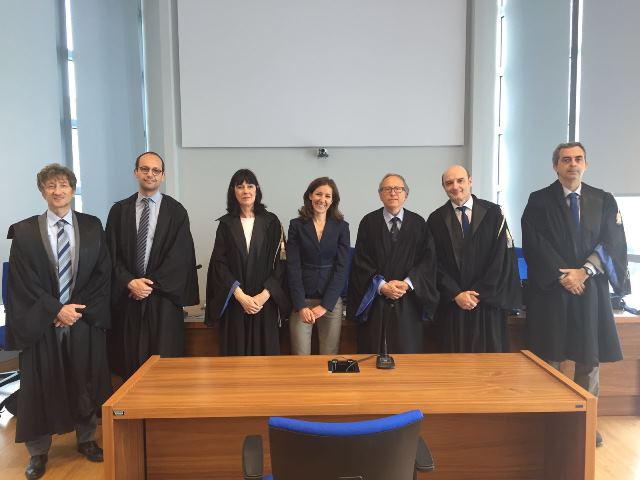DUE Chair
You are here : Home > DUE Chair > Educational activities > Thesis
Thesis defended by Elisa Fois "The productivity of the Court of justice in the field of the referral procedure" - he joint supervision of Marc Blanquet (IRDEIC) and University of Turin
May 27, 2016
10h30
Università degli Studi di Torino Lungo Dora Siena, 100 A, 10153 Torino, Italie salle Campus Luigi Einaudi
Thesis defended : The productivity of the Court of justice in the field of the referral procedure
Elisa Fois thesis: "The productivity of the Court of justice in the field of the referral procedure" - unde the joint suppervision of University of Turin and Toulouse 1 Capitole University
Abstract :
The present work, which is divided into two parts, aims at analyzing the productivity of the Court of justice as far as the workload inherent to the reference for preliminary ruling procedures is concerned. We have decided to conduct an analysis focused on such sources and such workload not only because of the fact that the workload inherent to the reference for preliminary rulings constitutes, today, the heaviest workload of the Court, but also because of the particularities of this procedure, that, being it a cooperation mechanism operating between courts, is different from any other procedure in front of the Court of justice, in as much as it does have no contentious nature. The first part of the work focuses on the sources of such workload in the perspective of the uniformity objective, namely the workload deriving from the interpretation of article 267 TFEU by the Court of justice, from the multilingual character of European Union law as well as from its principles of primacy and direct effect. The analysis that we conducted under part I allowed us to consider that the workload in the field of the references for preliminary rulings depends, inter alia, on the choices of the Court of justice, which are driven by the need to pursue the uniformity objective. The uniformity objective is certainly the fundamental objective of the reference procedure; however it is not the only objective that the Court must pursue. In this respect, considering that the increase of the workload is accompanied by the increase of the length of the proceeding, the issue concerning the productivity of the Court of justice, both in respect of its general activity and, more in particular, in respect of the referral procedure, emerged and the objective of rapidity became more and more important. Against this background, the second part of our work deals with the actions aiming at lightening the referral workload under the perspective of the necessity of rapidity. Such actions are examined at two different levels according to whether they aim at reducing the number of referrals arriving in front of the Court, or at reducing the length of the proceeding. The possibility of putting an end to the Court’s referral monopoly as well as the proposals concerning the strengthening of the national courts’ role and the filtering of references for preliminary rulings are analyzed. Furthermore, attention is given to the measures that the Court has adopted in order to reduce the length of the referral proceeding (simplification and optimization measures as well as the introduction of special proceedings). Such analysis allowed us to highlight the particularities and the value of the need of rapidity within the particular framework of the referral procedure. In this respect, such need takes form according to a non-contentious logic, which, namely, is not subject to the obligation of giving priority to the rights of the defense of the parties (which, indeed, do not exist within this proceeding). The rapidity objective must, on the contrary, be confronted, and balanced, with the objective of uniformity. The search of a balance between such two elements, uniformity and rapidity, constitutes what we can define as the productivity of the Court in the field of the referral procedure. Such productivity differs from the traditional judiciary productivity, which is characterized by a contentious logic, according to which a balance must be found between rapidity and parties’ rights of the defense. However, in our analysis we could observe that where the referral cases concern the protection of fundamental rights (of the parties of the main proceeding), the logic of the referral procedure seems to turn into a contentious one. The study of the productivity of the Court in the framework of its referral competence permits therefore also to highlight the adaptability that a cooperation mechanism such as the referral procedure can provide.
Abstract :
The present work, which is divided into two parts, aims at analyzing the productivity of the Court of justice as far as the workload inherent to the reference for preliminary ruling procedures is concerned. We have decided to conduct an analysis focused on such sources and such workload not only because of the fact that the workload inherent to the reference for preliminary rulings constitutes, today, the heaviest workload of the Court, but also because of the particularities of this procedure, that, being it a cooperation mechanism operating between courts, is different from any other procedure in front of the Court of justice, in as much as it does have no contentious nature. The first part of the work focuses on the sources of such workload in the perspective of the uniformity objective, namely the workload deriving from the interpretation of article 267 TFEU by the Court of justice, from the multilingual character of European Union law as well as from its principles of primacy and direct effect. The analysis that we conducted under part I allowed us to consider that the workload in the field of the references for preliminary rulings depends, inter alia, on the choices of the Court of justice, which are driven by the need to pursue the uniformity objective. The uniformity objective is certainly the fundamental objective of the reference procedure; however it is not the only objective that the Court must pursue. In this respect, considering that the increase of the workload is accompanied by the increase of the length of the proceeding, the issue concerning the productivity of the Court of justice, both in respect of its general activity and, more in particular, in respect of the referral procedure, emerged and the objective of rapidity became more and more important. Against this background, the second part of our work deals with the actions aiming at lightening the referral workload under the perspective of the necessity of rapidity. Such actions are examined at two different levels according to whether they aim at reducing the number of referrals arriving in front of the Court, or at reducing the length of the proceeding. The possibility of putting an end to the Court’s referral monopoly as well as the proposals concerning the strengthening of the national courts’ role and the filtering of references for preliminary rulings are analyzed. Furthermore, attention is given to the measures that the Court has adopted in order to reduce the length of the referral proceeding (simplification and optimization measures as well as the introduction of special proceedings). Such analysis allowed us to highlight the particularities and the value of the need of rapidity within the particular framework of the referral procedure. In this respect, such need takes form according to a non-contentious logic, which, namely, is not subject to the obligation of giving priority to the rights of the defense of the parties (which, indeed, do not exist within this proceeding). The rapidity objective must, on the contrary, be confronted, and balanced, with the objective of uniformity. The search of a balance between such two elements, uniformity and rapidity, constitutes what we can define as the productivity of the Court in the field of the referral procedure. Such productivity differs from the traditional judiciary productivity, which is characterized by a contentious logic, according to which a balance must be found between rapidity and parties’ rights of the defense. However, in our analysis we could observe that where the referral cases concern the protection of fundamental rights (of the parties of the main proceeding), the logic of the referral procedure seems to turn into a contentious one. The study of the productivity of the Court in the framework of its referral competence permits therefore also to highlight the adaptability that a cooperation mechanism such as the referral procedure can provide.
- Additional information :
- Jury :
M. Marc Blanquet Toulouse 1 Capitole University
M. Giuseppe Porro University of Turin
M. Massimo Condinanzi University of Milan
M. Michele Vellano Aosta Valley University
M. François-Xavier Millet University of the French West Indies
Mme Nathalie de Grove-Valdeyron Toulouse 1 Capitole University - Document(s) to download :
- fois-elisa-27-05-2016-avis-soutenance.pdf (PDF, 52117 kB)
Read more about the thesis
By clicking on the button "I accept", you allow cookies in order to measure the audience on our site. These data are intended for internal use only and shall not be disclosed.
Please refer to cookies policy
Please refer to cookies policy






